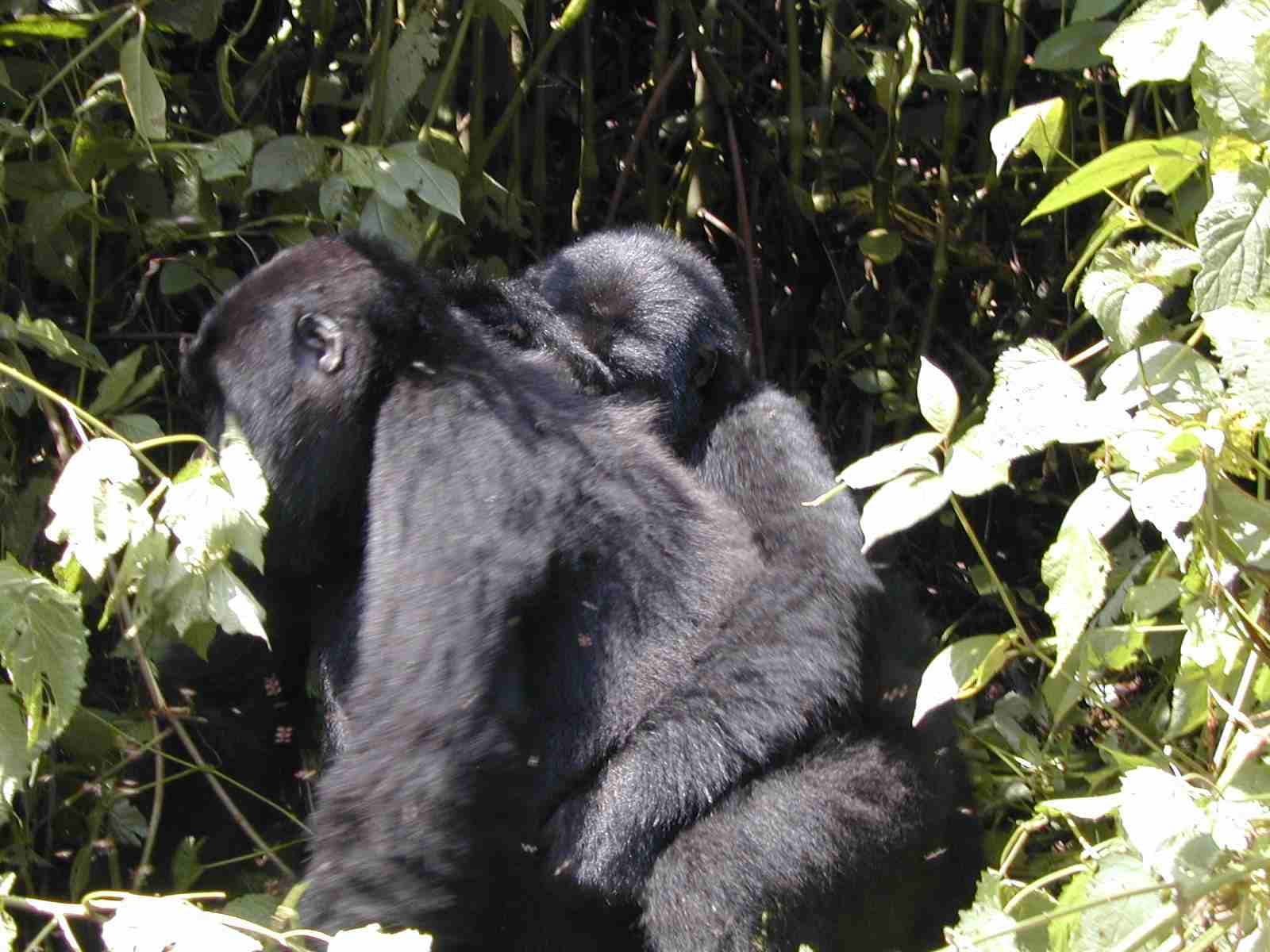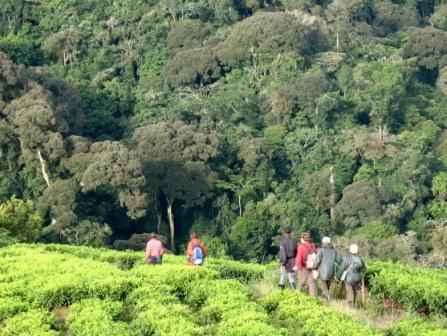Rwanda’s unit of currency is the Rwandan franc (RFr). IF you are travelling to Rwanda, it’s best to come to Rwanda with US dollars or euros in cash. The only useful bank branch in the country is Banque de Kigali in the capital, which offers cash advances on credit card and can change travellers cheques, neither of which is possible in the other provinces. There are ATMs in Kigali, but they are not yet wired to an international network. Credit cards can be used in some upmarket hotels and restaurants in Kigali.
Bureaux de change – which are mostly in Kigali – offer slightly better exchange rates than banks. Moneychangers hang around central Kigali and usually give a slightly better rate, but count your money carefully. All banks, and most bureaux de change, are closed on Saturday afternoon and Sunday.
Credit cards are not used widely and few cash machines take foreign credit cards. Unusually for this part of Africa, MasterCard is far more widely accepted than Visa (the Visa stickers you see outside some hotels refer to cards issued domestically). But even so, the use of MasterCard extends only certain up market hotels in Kigali and a very few places outside the capital. If you are relying on using a card, ten best to check what cards your hotel accepts when you make your booking. Worth noting here too that the ORTPN head office in Kigali also accepts MasterCard but not Visa.
If you have urgent payments to make it would be wise to carry cash instead of relying on the ATMS as they are so fond of failing to release cash when you need it most.
You can withdraw upto US$2500 per day (or equivalent in Rwanda Francs or any other hard currency to hand) against Visa or MasterCard in the Bancor on Ave de la Piax in Kigali. This is a remarkably straightforward procedure but be warned that it does depend on the bank having access to a specific website – if the electricity is down, or the computers or the internet server or the website itself, then this service will be unavailable and you may have to wait a day or two for it to comeback online.
As for travellers’ cheques (it is best if they are in euros or US dollars) – again, theoretically they can be cashed up to a value of US$200 daily at the Banque Commercial du Rwanda (BCR) and a few other banks in central Kigali, but in practice this can fall apart, or be quite a slow procedure. You will get a poorer exchange rate for travellers’ cheque than for cash. When cashing them, you must generally show the sales advice slip that you got when you obtained them – that is the slip of paper that one is supposed never to keep in proximity to the cheques!
That leaves cash. The preferred foreign currencies are the dollar or euro, but all main currencies should be exchangeable, whether in banks or in official or private forex bureaux. The official forex are clearly signed on the street and have standard facilities. The ‘private’ ones are small offices or rooms where the moneychangers who used to tour their wares on the street now operate since the black market was declared illegal. They may offer a slightly better exchange rate than in banks. They generally also give a better rate for larger-denomination notes, which anyway are less bulky for you to carry. Above all, because there is no paperwork involved, they have the advantage scene. Conditions regarding credit cards and traveler’s cheques may be different – and better – by the time you travel. But do have enough cash in case of glitches. If you don’t want to carry too much, arrange for a friend to send it to you from hoe when necessary, via Western Union – there are offices in Kigali and all the main towns. It isn’t cheap – the cost depends on the amount being transferred –but it’s quick and secure. Any Rwandan francs left over at the end of your trip can be changed back into dollars, euros or whenever by banks, forex bureaux or money-changers.
The above calculations don’t allow for more expensive one-off activities, such as gorilla-tracking ( a gorilla permit at at June 1st 2017 is $1500) or visiting the other national parks (not expensive unless you hire a vehicle). If you want to keep a particular budget and plan on undertaking such activities, you would be well advised to treat your day-to-day budget separately from one –off expenses.
Rwanda is so small, and all parts of it are so easily accessible from Kigali, that you needn’t engage in any complicated planning.
TIPPINGTipping is common is Rwandan cities these days due to the large international presence. Rwandan salaries are low and a tip of 10% will be appreciated. Tipping is an important part of a safari – expect to tip drivers, guides and cooks around US$10 per day per group depending on the safari.
How much?
Double room in a midrange hotel US$35-115
Meal in a midrange restaurant US$5-10
Tracking mountain gorillas US$750
100km bus ride US$2
Internet access per hour US$1-2
1L bottled water US$0.75
Primus beer US$2
Beef brochettes (street snack) US$1
Souvenir T-shirt US$10
Bureaux de change – which are mostly in Kigali – offer slightly better exchange rates than banks. Moneychangers hang around central Kigali and usually give a slightly better rate, but count your money carefully. All banks, and most bureaux de change, are closed on Saturday afternoon and Sunday.
Credit cards are not used widely and few cash machines take foreign credit cards. Unusually for this part of Africa, MasterCard is far more widely accepted than Visa (the Visa stickers you see outside some hotels refer to cards issued domestically). But even so, the use of MasterCard extends only certain up market hotels in Kigali and a very few places outside the capital. If you are relying on using a card, ten best to check what cards your hotel accepts when you make your booking. Worth noting here too that the ORTPN head office in Kigali also accepts MasterCard but not Visa.
If you have urgent payments to make it would be wise to carry cash instead of relying on the ATMS as they are so fond of failing to release cash when you need it most.
You can withdraw upto US$2500 per day (or equivalent in Rwanda Francs or any other hard currency to hand) against Visa or MasterCard in the Bancor on Ave de la Piax in Kigali. This is a remarkably straightforward procedure but be warned that it does depend on the bank having access to a specific website – if the electricity is down, or the computers or the internet server or the website itself, then this service will be unavailable and you may have to wait a day or two for it to comeback online.
As for travellers’ cheques (it is best if they are in euros or US dollars) – again, theoretically they can be cashed up to a value of US$200 daily at the Banque Commercial du Rwanda (BCR) and a few other banks in central Kigali, but in practice this can fall apart, or be quite a slow procedure. You will get a poorer exchange rate for travellers’ cheque than for cash. When cashing them, you must generally show the sales advice slip that you got when you obtained them – that is the slip of paper that one is supposed never to keep in proximity to the cheques!
That leaves cash. The preferred foreign currencies are the dollar or euro, but all main currencies should be exchangeable, whether in banks or in official or private forex bureaux. The official forex are clearly signed on the street and have standard facilities. The ‘private’ ones are small offices or rooms where the moneychangers who used to tour their wares on the street now operate since the black market was declared illegal. They may offer a slightly better exchange rate than in banks. They generally also give a better rate for larger-denomination notes, which anyway are less bulky for you to carry. Above all, because there is no paperwork involved, they have the advantage scene. Conditions regarding credit cards and traveler’s cheques may be different – and better – by the time you travel. But do have enough cash in case of glitches. If you don’t want to carry too much, arrange for a friend to send it to you from hoe when necessary, via Western Union – there are offices in Kigali and all the main towns. It isn’t cheap – the cost depends on the amount being transferred –but it’s quick and secure. Any Rwandan francs left over at the end of your trip can be changed back into dollars, euros or whenever by banks, forex bureaux or money-changers.
Planning Your spending in Rwanda
Your planned expenditure will largely depend on what you intend to do during your visit, where you want to go, which kind of hotels and services you intend to utilize. Generally speaking though, please inform your travel agent of a rough figure you plan to spend on your visit so that they can draw out the most apporpriate plan for you. Pre-booked packages do vary in terms of what is included in the price, and you are advised to check the exact condition in advance, but generally the price quoted will cover everything but drinks, tips and perhaps some meals.
For budget travellers, Rwanda is not the cheapest country in Africa, but it is damn close to it – and after Ghana it offers the best value for money of any country I have visited in the last couple of years. Throughout the country, a soft drink will cost you around US$0.40 and a 700ml beer less than US$1 in a local bar, more in a hotel or restaurant that caters primarily to Westerners. A meal in local restaurant will cost US$1-1 while a meal in a proper restaurant might cost U$4 upwards. Budget accommodation can average out about US$5 per head, quite often for a self-contained room (two people) with a hot shower or bath. Public transport is cheap- typically about US$1 per 50km – and distances are relatively small. Taking the above figures into account I think that budget travellers could scrape by inmost parts of Rwanda on around US$10-15 per day for one-person or US$20 per day for two.The above calculations don’t allow for more expensive one-off activities, such as gorilla-tracking ( a gorilla permit at at June 1st 2017 is $1500) or visiting the other national parks (not expensive unless you hire a vehicle). If you want to keep a particular budget and plan on undertaking such activities, you would be well advised to treat your day-to-day budget separately from one –off expenses.
Rwanda is so small, and all parts of it are so easily accessible from Kigali, that you needn’t engage in any complicated planning.
TIPPINGTipping is common is Rwandan cities these days due to the large international presence. Rwandan salaries are low and a tip of 10% will be appreciated. Tipping is an important part of a safari – expect to tip drivers, guides and cooks around US$10 per day per group depending on the safari.
How much?
Double room in a midrange hotel US$35-115
Meal in a midrange restaurant US$5-10
Tracking mountain gorillas US$750
100km bus ride US$2
Internet access per hour US$1-2
1L bottled water US$0.75
Primus beer US$2
Beef brochettes (street snack) US$1
Souvenir T-shirt US$10




